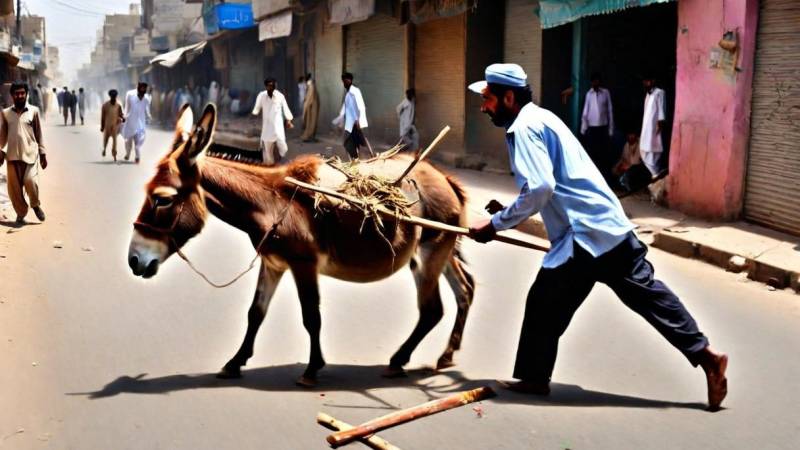
Two incidents which recently took place in Pakistan have highlighted the immense cruelty many animals endure in the country daily. In one case, a camel calf in Sindh's Sanghar district had its leg chopped off for foraging in a landlord's field. In another, a donkey's ears were sliced off near Rawalpindi over a land dispute. The Sindh government is providing veterinary care to the camel calf and is arranging a prosthetic leg for it from the UAE. The perpetrators in both cases have been taken into custody by the relevant authorities, and cases have been registered against them. While swift action from the government in these two cases is appreciable, sadly, one does not get the feeling that these will be the last cases of cruelty or abuse of animals that we will hear of in Pakistan.
Animal abuse is a common phenomenon worldwide. Pakistan too has its share of people who have displayed their brutal lack of compassion for animals. Some have pointed to the lack of adequate laws to address the issue. In contrast, others have stressed the urgent need to update existing laws to make them commiserate with modern-day challenges. At the same time, others still call for a deeper exercise that seeks a multipronged approach to educate and sensitise the masses on the importance of animals and the rights that these creatures enjoy under human and divine laws.
Activists point to how, among other forms of animal abuse and cruelty, the aspect of animal abuse in the name of protests was deeply concerning. Animals - especially some exotic ones - are frequently used as bewildered, anxious and unwilling participants of protest demonstrations, where they are usually mistreated or exploited to make a political statement or draw attention to a cause. This form of cruelty not only inflicts further suffering on the animal but also raises ethical questions about methods used in protests and the general mental state of protest participants in particular and society in general. A recent incident reported in The Nation involved protesters in Islamabad who had clubbed a wild boar to death. Someone had scrawled "Go, Nawaz, Go" across the abdomen of the poor boar. The animal was tied up using cables and was brutally beaten to death using sticks.
Unfortunately, this was not an isolated event. Ahead of the May 2013 general elections, a white tiger was paraded in a political rally staged in support of the Pakistan Muslim League-Nawaz (PML-N). There were conflicting reports about how the poor animal, which was not accustomed to the loud sounds and high temperatures during rallies, died in the rally.
Senator Khawaja noted that passing this bill would send a positive message to the global community, as animal rights are taken very seriously in other countries, although awareness of these rights is still lacking in Pakistan
These events highlight a disturbing trend of animals being exploited and mistreated in political demonstrations, leading to severe suffering and, in some cases, death. Such treatment of animals is not only cruel but also reflects a broader disregard for animal rights. It is crucial for society to recognise the importance of treating all creatures with kindness and respect and for the authorities to enforce laws that protect animals from such abuse.
Witnessing growing cruelty towards animals in society, the Senate Standing Committee on Interior recently passed "The Prevention of Cruelty to Animals (Amendment) Bill, 2018." The bill had been introduced by Senator Karim Ahmed Khawaja. This bill is significant because it updates many outdated animal rights laws which were originally introduced by the British as far back as 1890 and have not been amended since. Senator Khawaja emphasised that the current structure of fines for animal cruelty is too low to be effective. For instance, the fine for killing an animal with unnecessary cruelty was just Rs200 (a small fortune in 1890, but not so in 2018), but his bill proposes increasing it to Rs300,000 along with a prison sentence. Similarly, the fine for killing a goat with cruelty would rise from Rs100 to Rs200,000 and for overloading animals from Rs100 to Rs200,000. Additionally, the fine for inciting animals to fight was previously set at Rs50, but in the new law, it would be increased to Rs300,000.
The bill also addresses the issue of sick animals being abandoned, with fines for such neglect rising from Rs50 to Rs200,000. Senator Khawaja noted that passing this bill would send a positive message to the global community, as animal rights are taken very seriously in other countries, although awareness of these rights is still lacking in Pakistan. By passing the bill, committee members recognised the necessity of updating these laws to reflect contemporary values and concerns.
Apart from the Senate committee, the federal government has decided to ban testing and surgeries on live animals at veterinary schools and industrial complexes in the federal capital. This decision was announced alongside introducing a Rs15,000 ($73) fine and potential jail terms for those found guilty of animal cruelty. However, critics argued that this was less of a fine for a man to pay in modern times to prove to be a deterrent.
Thus, to create a safer environment for animals at zoos, circuses, and neighbourhoods, those who harm animals must be punished. The existing colonial-era law against animal cruelty must be updated with stronger penalties. Additionally, our society needs to be educated about animal rights - whether from a contemporary educational angle, animal rights or religious angle. Schools, madrassahs, community leaders and even clerics should emphasise the importance of treating animals with kindness and respect. While human rights issues are prevalent in Pakistan, it is also crucial to protect animals from harm.

